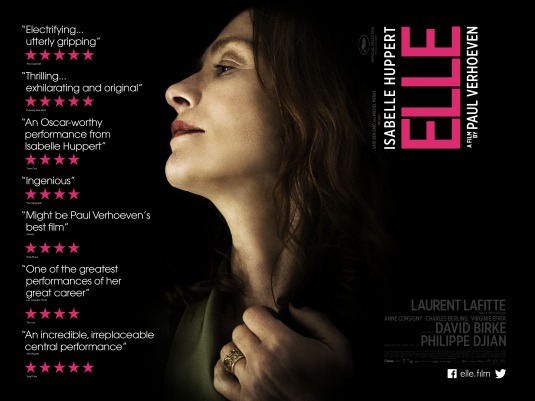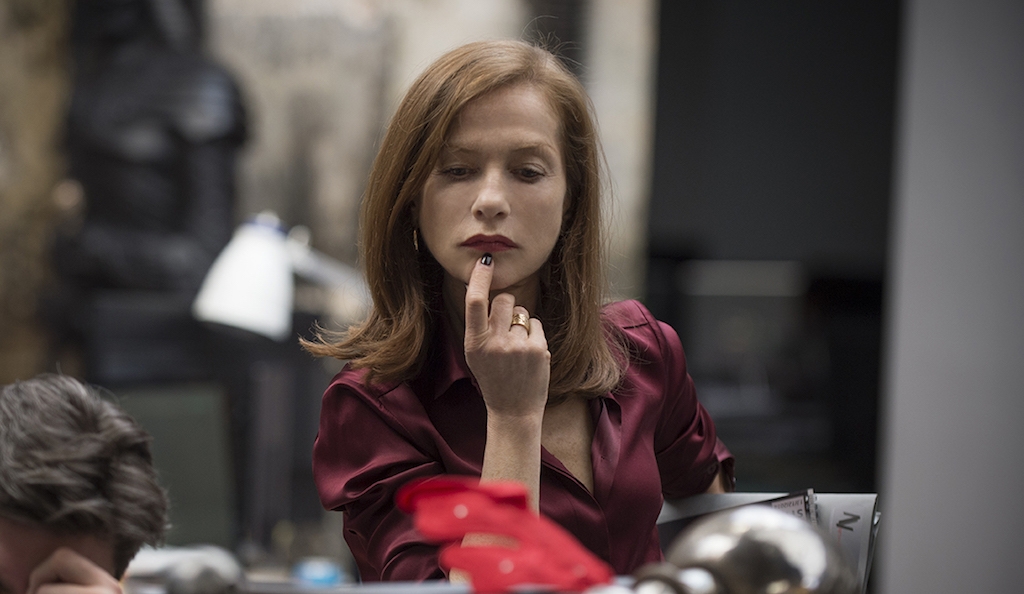The latest film from Robocop director Paul Verhoeven really is a divisive film. Verhoeven tried making it in America but studios balked at its content, forcing him to direct his first French-speaking film. Maybe the open-minded and liberal European independent circuit would help Elle with its difficult subject matter? And this seems to have worked. The film has been met with rapturous applause from the vast majority of critics, citing its unconventional and uncompromising narrative, plus a powerhouse performance from Isabelle Hubbert. However, like last year's Nocturnal Animals, a growing consensus amongst feminist writers view Elle as trash and irresponsible. And following a conversation with someone who was desperate to discuss the film with me, I knew this one would cause a reaction of some kind. So when a one-off screening cropped up on the hottest day of the year at Bradford’s National Science and Media Museum, I knew I wanted to retreat from the sun and watch this awkward and potentially uncomfortable film. Because I'm dedicated to my work!
 |
| Isabelle Hubbert gives a fantastic, multi-layered performance of a complex and morally ambiguous character |
Elle follows titular character, Michele, as she comes to terms with the after-effects of a rape. At first she seems to carry on as normal but she soon becomes fascinated by her attacker. The film does not dive into the expected narrative pins of a victim. Thus, she begins to pursue her attacker as she drifts in a dream-like state across modern Paris as we begin to get to know the real Michele. Because she is a complicated and genuinely interesting character. We begin to understand her traumatic childhood, her work (she's the CEO of a video game studio, which those around her view as an odd contradiction), her family and friendship circles, her relationship with her son and ex-husband and finally her own sexual desires. Michele becomes madly intent on uncovering the identity of her attacker. It's a spiralling mystery, for sure…
There is plenty to recommend about Elle. Isabelle Hubbert gives a phenomenal performances as Michele. She builds this up through subtle body-language to create, for all intents and purposes, an unlikeable character. She's a contradiction and the film is clearly toying with where are sympathies should lie (and we’ll put a pin in that one, we’ll come back to it later). It's a multi-layered and rich performance. The plot is genuinely interesting and keeps you guessing right up until the end. The visuals of the film are equally-skilled, shot in muted colours and making use of long-takes. It's very successful at slowly building up a rich world for its character to inhabit through subtle camera work, tasteful editing and good pacing. There are reverting moments that make the 130 minute run time fly by. Those expecting a sleazy, Showgirls-esque plot will be ... disappointed as this is a very levelled and well crafted character study.
 |
| Elle deals in part with a very difficult subject matter that unfortunately joins a wider debate on the depiction of rape in film |
However, we all know what the elephant in the room is. Elle uses rape as a launchpad for an exploration of sexual desire. The film touches upon some interesting elements - I don't think it's completely without merit. Michele refuses to become a victim and it is a different kind of rape narrative devoid of clear-cut morals. The moments after the first rape, as she casually gets ready for work and goes about her day are fascinating and extremely uncomfortable. However, I have a hard time with any kind of representation of rape on screen. Like other traumatising events, rape is never properly addressed, nevermind the after-effects that an all-male creative team might struggle to understand. With a recent rise in rape narratives, the most gratuitous and frustrating being Game of Thrones, Elle ultimately does not do a lot to snuff these flames. Ultimately, Michele is continually raped and beaten over the course of the film. No common ground is reached – she is always the victim. This seemingly undermines the whole narrative. Her actions throughout the film, as she interacts with friends, neighbours and family, make her hard to relate to and really get a grip on. Which does make for a genuinely interesting character – it just unfortunately joins a wider trend where rape is used as shorthand for a traumatising event that doesn't really engage with the subject matter. On the other hand, men are viewed as either weak (Michele’s son), failures (Michele’s ex-husband) or as predatory (Michele’s new admirer and the attacker) and other women are equally viewed as weak or manipulative. It's a bleak outlook. Verhoeven has a great history as a satirical filmmaker. Robocop, one of my all-time favourites by-the-by, is a brilliant social satire of rampant 80s consumerism and the failure of the system. Is he attempting a similar thing with Elle with an over-the-top rape empowerment narrative, examining how society views victims and gender roles? Who knows what was going on in Verhoeven’s head and your reaction to the suspect gender and sexual politics will impact your overall enjoyment of the film.
Because rape is all too real and cinema has never really found an eloquent way to communicate this. Unfortunately, while Elle is a fascinating character study of a deeply flawed human being, the film joins an increasingly large narrative of detached stories dealing with this horrendous act and wider misogynistic trends. Call it bad timing but this film is being used as a launchpad to discuss how poorly cinema and wider media handles this. So depending on how you react to the central narrative will completely shape your opinion of the film. The filmmaking is excellent – the goal and intent of the filmmakers is confused and potentially damaging. I'm not calling for a stop on all films dealing with rape, as cinema has always been a way of exploring the human condition, it just needs to find smarter ways of communicating this before dealing with more morally ambiguous material and not use rape as shorthand. Honestly, I would recommend watching it so you can join the discussion that will no doubt roll on for years in cinema crowds...should this be the kind of thing that cinema deals with and can it do it effectively?


No comments:
Post a Comment